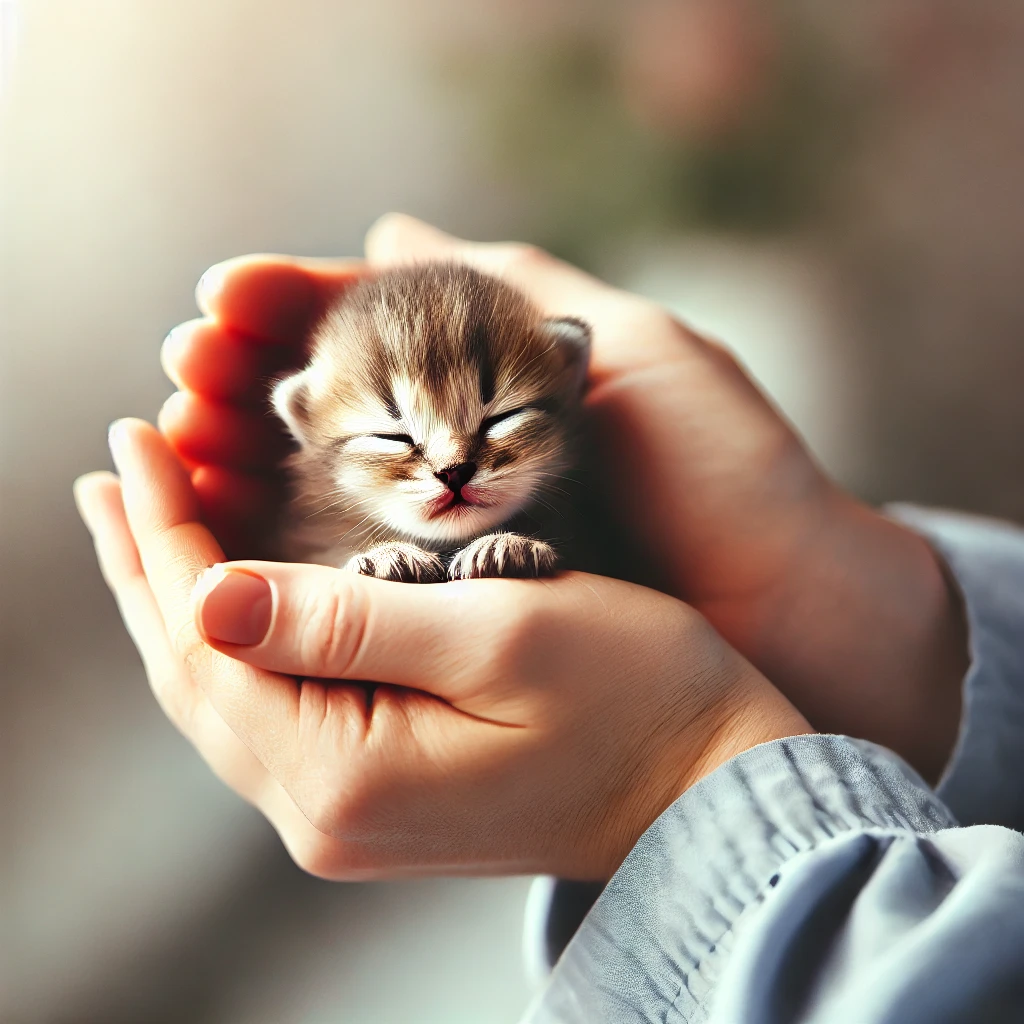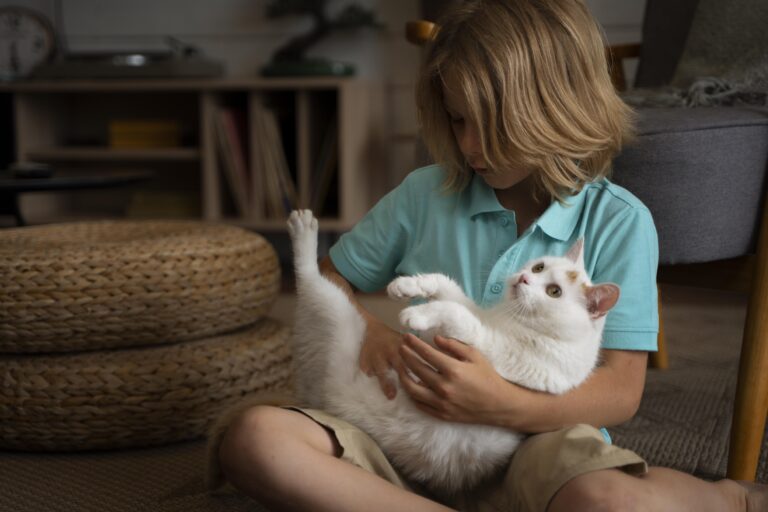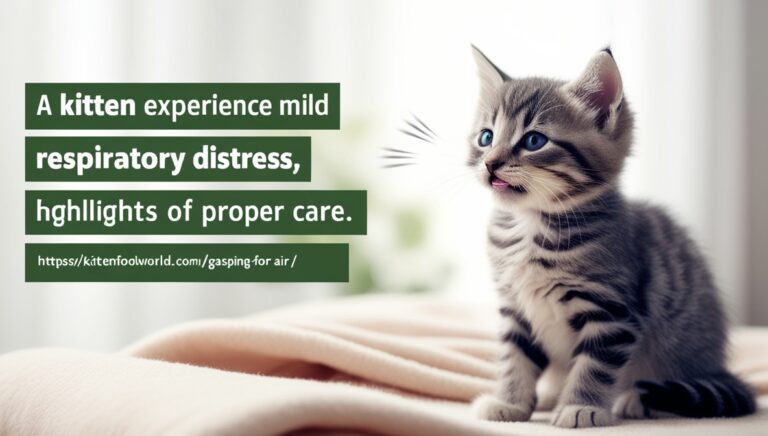How to Take Care of a Kitten Without a Mother
Table of Contents
Caring for a kitten without a mother is a challenging but rewarding responsibility. These tiny, vulnerable creatures depend entirely on you for survival and development. Whether you’ve found an orphaned kitten or are raising one from birth, understanding how to provide proper care is essential.
Understanding the Needs of a Motherless Kitten
When a kitten is born, it relies on its mother for warmth, nourishment, and hygiene. Without a mother, you’ll need to fill these roles. Let’s explore the critical aspects of caring for a newborn kitten without a mother.
If you’ve found an orphaned or abandoned kitten, it’s crucial to take immediate steps to ensure their survival. Learn more about what to do when you find an abandoned kitten.
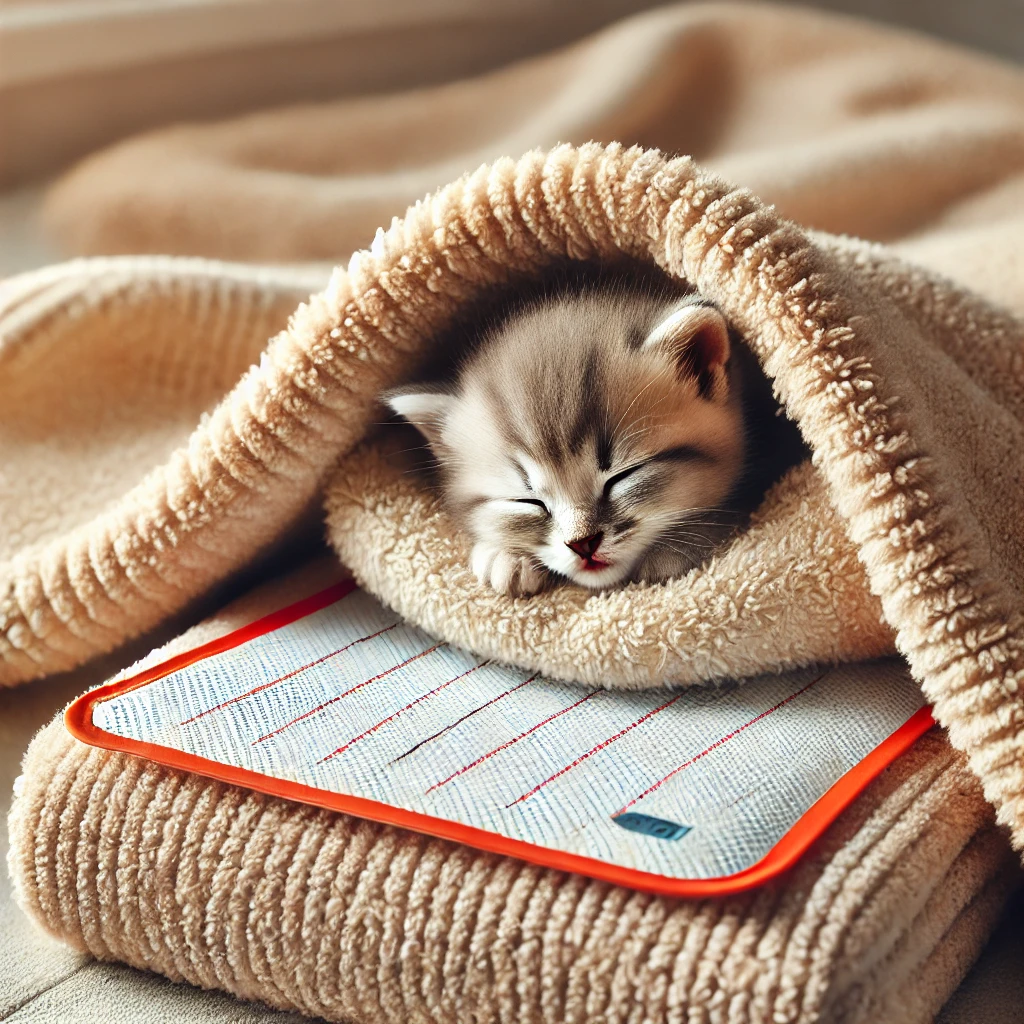
1. Warmth and Comfort: The First Priority for kitten health
Newborn kittens cannot regulate their body temperature. Keeping them warm is crucial for their survival.
- Creating a Warm Environment For Kitten: Use a heating pad set on low, wrapped in a soft towel, or a hot water bottle (covered to prevent burns). Place these under half of the kitten’s bedding so they can move away if they get too warm.
- Monitoring Temperature of Kitten: Keep the environment between 85-90°F (29-32°C) for the first week, gradually lowering it as they grow older. A thermometer can help you maintain the right temperature.
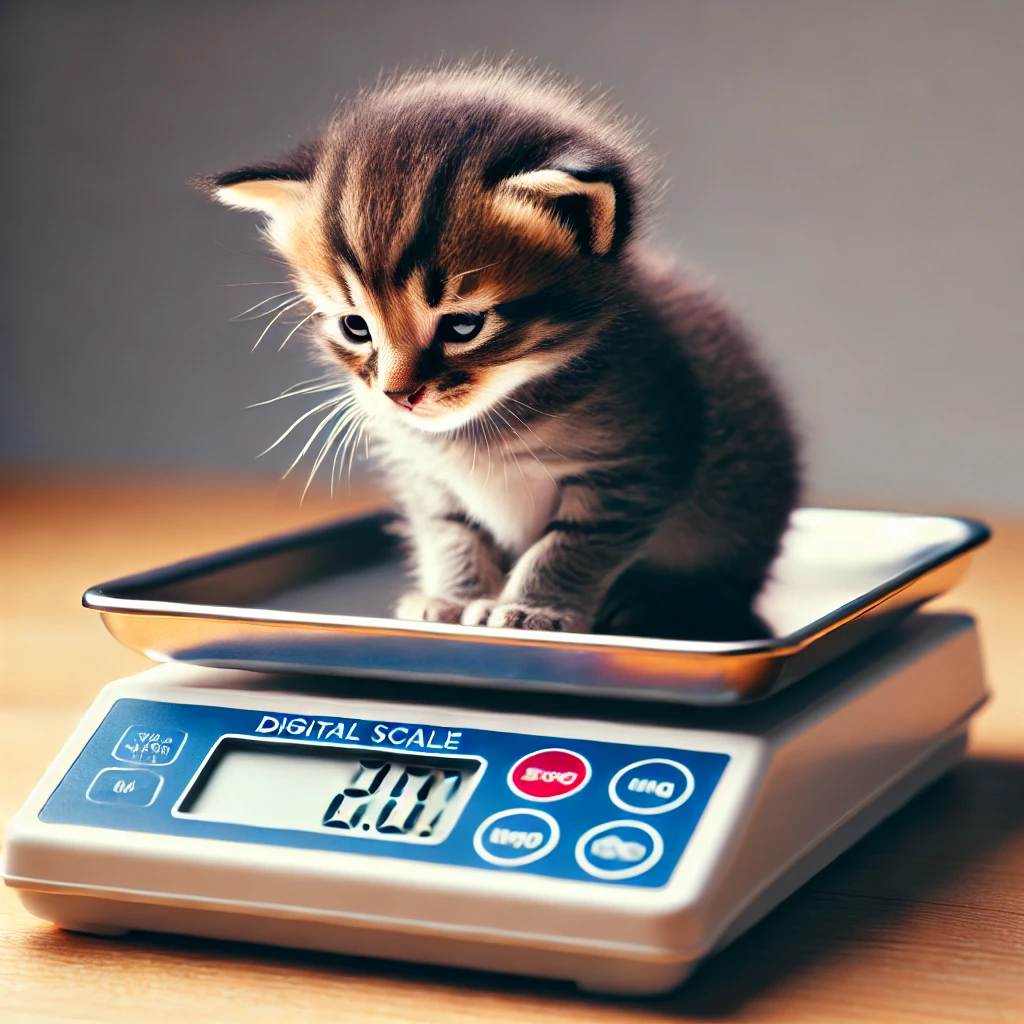
2. Feeding a Motherless Kitten: What You Need to Know
Feeding is the most critical aspect of kitten care. Without a mother’s milk, you’ll need to provide a suitable substitute.
- Choosing the Right Formula For Kitten: Use a commercial kitten milk replacer (KMR). Cow’s milk is not suitable and can cause digestive issues. Kitten formula provides the necessary nutrients for growth and development.
- Feeding Schedule For Kitten: Newborn kittens need to be fed every 2-3 hours, even at night. As they grow older, the frequency decreases, but you should still feed them regularly to ensure steady growth.
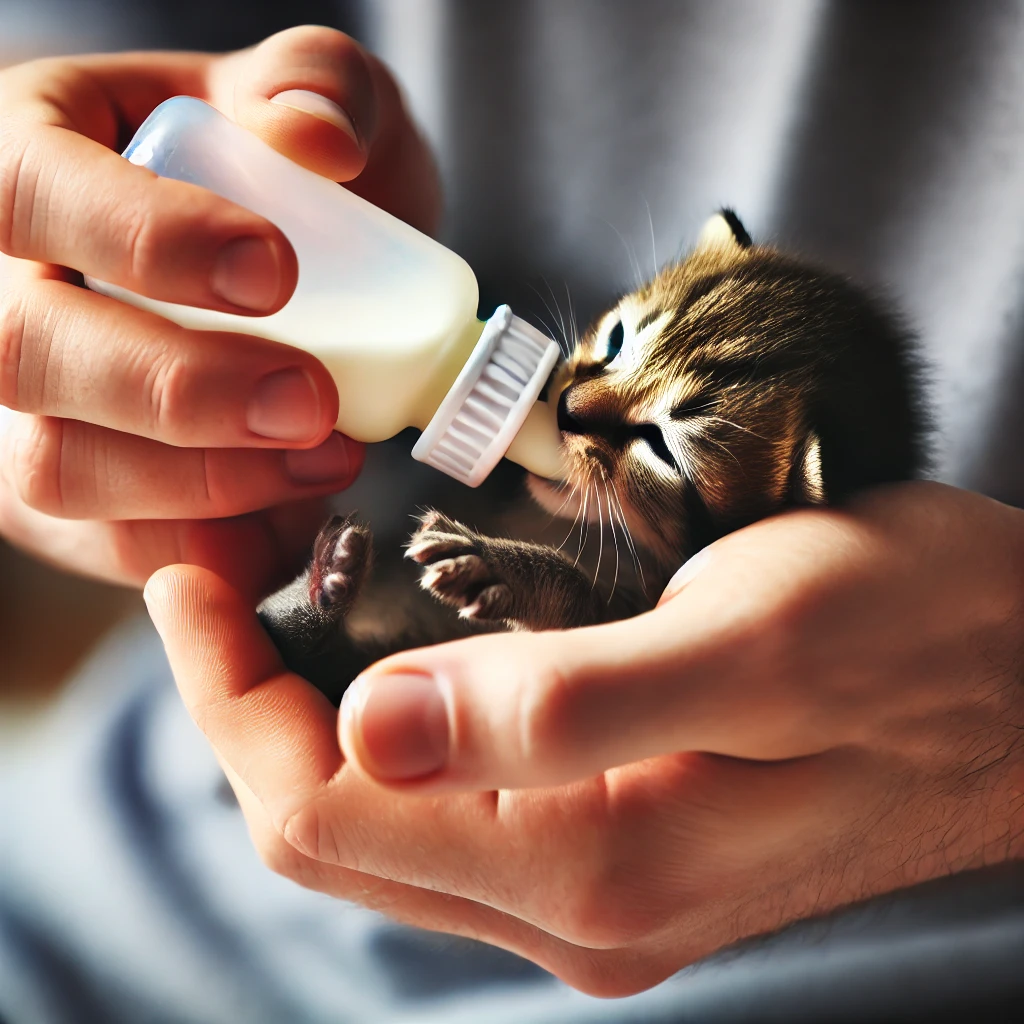
How Often Do You Feed Newborn Kittens?
Newborn kittens should be fed every 2-3 hours. By the second week, this can be stretched to every 3-4 hours. As they approach four weeks, you can start introducing solid food.
- Kitten Feeding Technique: Use a bottle specifically designed for kittens. Hold the kitten in a natural, belly-down position while feeding to prevent aspiration. Make sure the formula is warm, but not hot, before feeding.
- Kitten Monitoring Weight Gain: Weigh the kitten daily to ensure they are gaining weight steadily. A healthy kitten should gain 10-15 grams per day.
3. Hygiene and Stimulation: Assisting Your Kitten’s Basic Needs
Kittens under four weeks old need help with urination and defecation. In nature, the mother cat stimulates these functions by licking the kitten’s genital area.
- How to Stimulate Elimination: After each feeding, gently rub the kitten’s lower abdomen and genital area with a warm, damp cloth to stimulate urination and defecation. This should be done until the kitten is around 4 weeks old, at which point they can start using a litter box.
- Cleaning the Kitten: Use a soft, damp cloth to clean the kitten if they become soiled. Avoid bathing them in water as they can easily become cold.
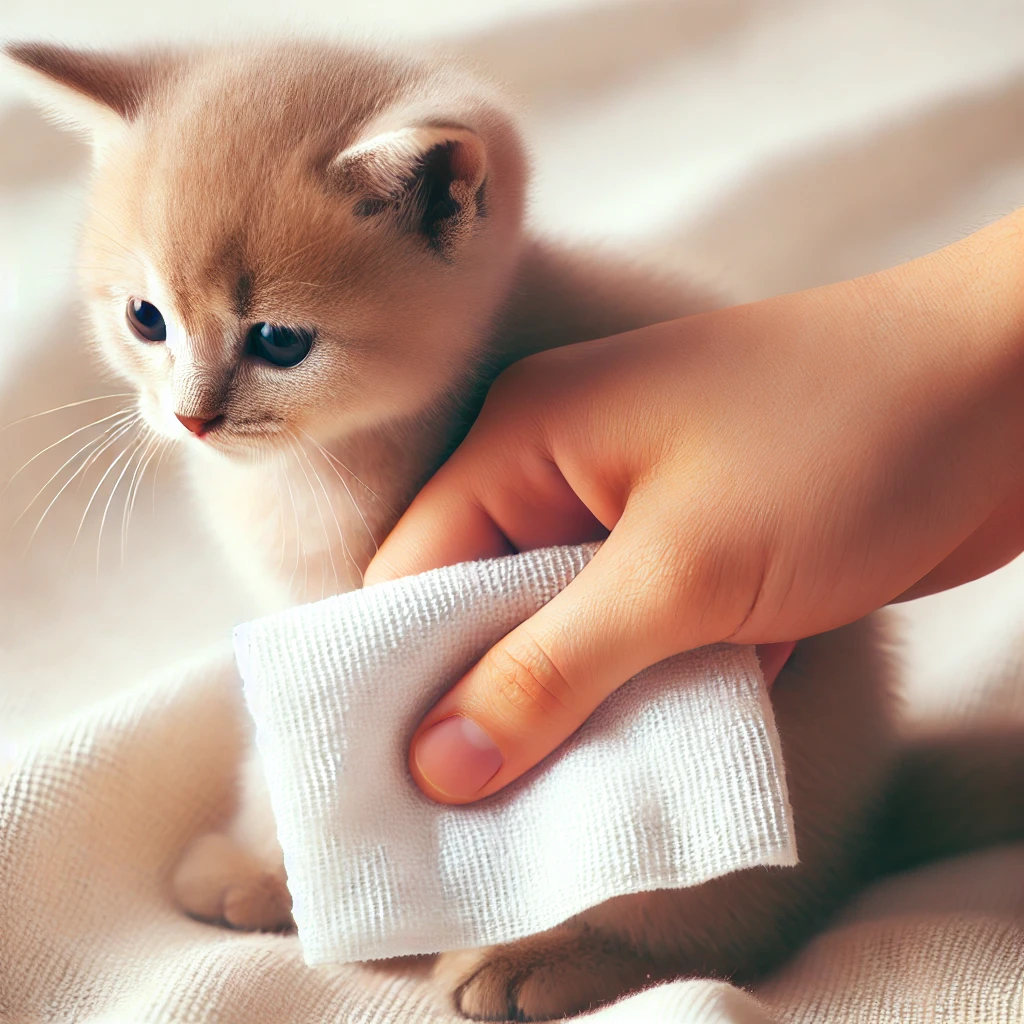
4. Socialization and Development: Nurturing a Well-Rounded Kitten
Kittens start to develop their social skills at around 3 weeks of age. Since they don’t have a mother or siblings to interact with, it’s crucial to introduce gentle handling and play early on.
- Handling and Bonding: Handle the kitten regularly to get them used to human contact. Gentle petting and cuddling help build trust and socialization.
- Introduction to Solid Food: At around 4 weeks, start introducing kitten-specific wet food or a gruel made from formula and wet food. This will ease their transition from bottle feeding to solid food.
5. Health Monitoring and Veterinary Care of Kitten
Without a mother, the health of a kitten can be more vulnerable. Regular monitoring and veterinary care are essential.
- Signs of Health Issues in Kittens: Watch for signs of illness such as lethargy, refusal to eat, diarrhea, or respiratory issues. Any of these symptoms warrant a visit to the vet.
- Signs of Health Issues in Kittens: Start vaccinations and deworming according to your vet’s recommendations, usually beginning at 6-8 weeks of age.
6. Transitioning to Independence of kittens
As the kitten grows, it will become more independent. Your role will shift from caregiver to guide as they learn to eat on their own, use the litter box, and play.
- Weaning Process of kitten: Gradually reduce bottle feedings as the kitten begins eating more solid food. By 8 weeks, most kittens are fully weaned.
- Litter Training of Kitten: Introduce a shallow litter box with non-clumping litter. Most kittens instinctively use a litter box, but you may need to guide them initially.
As your kitten grows and becomes more independent, it’s important to provide the right environment for their development. Explore more tips on caring for your new kitten here.
What Should You Expect When Caring for Newborn Kittens?
Caring for a motherless kitten is a time-consuming but incredibly rewarding process. Expect to spend a lot of time feeding, cleaning, and providing warmth and comfort. The first few weeks are the most demanding, but as the kitten grows, the workload decreases.
how to take care of a newborn kitten without a mother?
Caring for a newborn kitten without a mother can be challenging but rewarding. First, keep the kitten warm as they cannot regulate body temperature. Use a soft blanket and a warm (not hot) heating pad under their bed, ensuring there’s room to move away from the heat if they get too warm.
Feeding is essential: use a kitten milk replacer (never cow’s milk) and a small bottle, feeding them every 2-3 hours. Gentle stimulation is needed after feeding to help them urinate and defecate. Finally, give them plenty of love and attention to help them feel safe and nurtured during these critical early weeks.
FAQs About Caring for a Kitten Without a Mother
How do I feed a kitten without a mother?
Feeding an orphaned kitten requires a milk replacement formula, as cow’s milk can upset their stomach. Use a kitten milk replacer, available at pet stores or veterinary clinics, and feed them using a bottle or syringe designed for kittens. Ensure the formula is warmed to body temperature and feed them every 2-4 hours, depending on their age.
What is the best milk replacer for orphaned kittens?
Kitten-specific milk replacers such as KMR (Kitten Milk Replacer) are ideal. These are specially formulated to meet the nutritional needs of kittens. Avoid using cow’s milk or plant-based alternatives, as they lack the essential nutrients kittens require.
How often should I feed an orphaned kitten?
Newborn kittens up to one week old need to be fed every 2-3 hours, including nighttime feedings. As they grow, you can gradually increase the time between feedings to every 4-6 hours by the time they are 4 weeks old.
How do I keep an orphaned kitten warm?
Kittens under 4 weeks old cannot regulate their body temperature. Provide warmth using a heating pad set on low, wrapped in a towel, or a warm water bottle. Ensure the heat source covers only part of their space so they can move away if they get too warm.
How do I stimulate a kitten to go to the bathroom?
Mother cats lick their kittens to stimulate urination and defecation. You can replicate this by gently rubbing their genital area with a warm, damp cotton ball or soft cloth after every feeding. This should be done until they are about 3-4 weeks old.
At what age can kittens start eating solid food?
Kittens can begin transitioning to solid food around 4 weeks of age. Start with a gruel made of kitten wet food mixed with milk replacer. Gradually reduce the milk replacer as they grow older.
What type of solid food is best for kittens?
High-quality kitten wet food or dry kibble specially formulated for kittens is best. Ensure the food is rich in protein and nutrients to support their growth and development.
How do I socialize an orphaned kitten?
Handle the kitten gently and often to help them get used to human contact. Provide them with toys and spend time playing with them daily. Introduce them to new sights, sounds, and experiences to encourage healthy social development.
How do I know if the kitten is sick?
Signs of illness in kittens include lethargy, poor appetite, diarrhea, vomiting, sneezing, nasal discharge, or difficulty breathing. If you notice any of these symptoms, consult a veterinarian immediately.
When should I take an orphaned kitten to the vet?
Take the kitten to the vet as soon as possible for a health check and vaccinations. Regular check-ups are essential to monitor their growth and overall health. Vaccinations typically begin at 6-8 weeks of age.
Can I bathe an orphaned kitten?
Avoid bathing very young kittens unless absolutely necessary, as they can become chilled easily. If they need cleaning, use a warm, damp cloth to gently wipe them down. For older kittens, ensure the bath is warm, and dry them thoroughly afterward.
How much sleep does an orphaned kitten need?
Newborn kittens sleep around 90% of the time, gradually reducing as they grow older. Ensure their sleeping area is warm, quiet, and safe to allow them to rest properly.
How do I provide proper bedding for an orphaned kitten?
Use a small box or carrier lined with soft blankets or towels. Ensure the bedding is clean, dry, and warm. Replace soiled bedding regularly to maintain a hygienic environment.
What toys are safe for orphaned kittens?
Soft, lightweight toys such as small balls or stuffed animals are ideal. Avoid toys with small parts or strings that could pose a choking hazard.
How can I help an orphaned kitten learn to use a litter box?
Place the kitten in a shallow litter box after meals and gently scratch their paws in the litter. Use non-clumping, unscented litter to prevent ingestion of harmful substances.
When can I start weaning an orphaned kitten?
Weaning typically begins at 4 weeks of age. Gradually introduce solid food alongside milk replacer, and reduce bottle feeding as they start eating more on their own.
How do I prevent fleas and parasites in orphaned kittens?
Consult your vet before using flea treatments, as many are not safe for young kittens. Keep their environment clean, and check for fleas or parasites regularly.
What should I do if the kitten is crying frequently?
Frequent crying can indicate hunger, cold, or discomfort. Ensure the kitten is fed, warm, and has a clean and comfortable environment. If the crying persists, consult a veterinarian.
How do I handle a kitten that is biting or scratching?
If a kitten bites or scratches during play, redirect their attention to a toy. Avoid using your hands as toys to prevent them from associating hands with play.
How long does it take for an orphaned kitten to become independent?
Kittens typically become independent around 8-12 weeks of age. By this time, they should be eating solid food, using the litter box, and socializing well with humans and other pets.
Conclusion
Taking care of a kitten without a mother requires dedication, patience, and a lot of love. By providing warmth, proper nutrition, hygiene, and socialization, you can help your kitten grow into a healthy and well-adjusted cat. Always consult with a veterinarian for advice tailored to your kitten’s needs.
References
- Kitten Lady – How to Care for Orphaned Kittens
- ASPCA – Kitten Care Guide
- The Humane Society of the United States – Caring for Orphaned Kittens
- Cornell University College of Veterinary Medicine – Newborn Kitten Care

